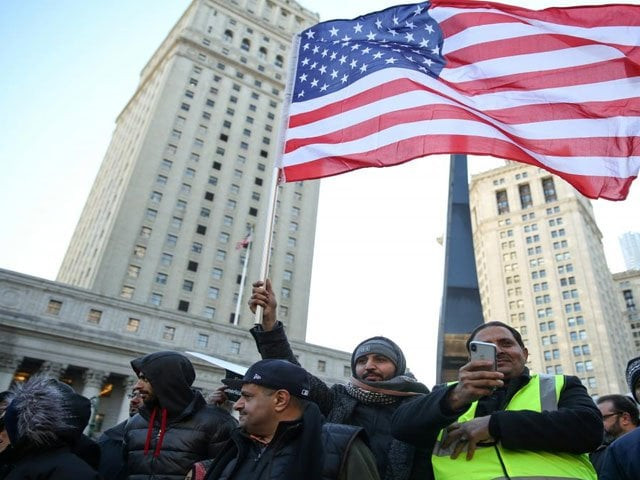US Supreme Court to decide legality of Trump travel ban
The court is due to hear arguments in April and issue a ruling by the end of June

New York Yemeni Americans demonstrate in response to US President Donald Trump's travel ban and recent denials of visa applications in Foley Square in lower Manhattan in New York City. PHOTO: REUTERS
The conservative-majority court is due to hear arguments in April and issue a ruling by the end of June on whether the policy violates federal immigration law or the US Constitution's prohibition on religious discrimination.
Trump's policy, announced in September, blocks entry into the United States of most people from Chad, Iran, Libya, Somalia, Syria and Yemen. The legal fight involves the third version of a contentious policy Trump first sought to implement a week after taking office in January 2017.
The Supreme Court on Dec. 4 signaled it was likely to uphold the ban when, on a 7-2 vote, it let it go into full effect while legal challenges by the state of Hawaii and others continued.
Trump signs new travel ban, imposes restrictions on 8 countries
Lower courts had partially blocked the ban. The Republican president has said the policy is needed to protect the United States from terrorism by Islamic militants.
Those challenging the travel ban have argued that it was motivated by Trump's enmity toward Muslims, pressing that point in court with some success by citing statements he made as a candidate and as president. As a candidate, Trump promised "a total and complete shutdown of Muslims entering the United States." As president, he has rescinded protections for hundreds of thousands of immigrants who were brought into the country illegally as children, sought to ramp up deportations and pursued new measures restricting legal immigration.
In November, he shared on Twitter anti-Muslim videos posted by a far-right British political figure. "We have always known this case would ultimately be decided by the United States Supreme Court. This will be an important day for justice and the rule of law. We look forward to the court hearing the case," said Hawaii Attorney General Douglas Chin, a Democrat.
Second US judge orders freeze on Trump travel ban Washington
Trump's ban also covered people from North Korea and certain government officials from Venezuela, but lower courts had already allowed those provisions to go into effect.
'The nation's interest'
The case represents a high-profile test of presidential powers. In court papers, US Solicitor General Noel Francisco, arguing for the Trump administration, said the president has "broad authority to suspend or restrict the entry of aliens outside the United States when he deems it in the nation's interest."
The latest ban was introduced on Sept. 24 after what Francisco called an "extensive, worldwide review" to determine which foreign governments provide information required by the United States to vet those seeking entry.
The countries on the list are those that do not share that information or present "other heightened risk factors," Francisco said. Hawaii's lead lawyer Neal Katyal said in court papers that the president has only limited authority to exclude entry of people from other countries.
Far-rights EU politicians band together against Islam, encourage Trump style travel ban
Under a US law called the Immigration and Nationality Act, a president can restrict entry only of those deemed a potential threat or in certain emergency situations. The law also prohibits discrimination on the basis of nationality.
The law does not "surrender to the president a boundless authority to set the rules of entry and override the immigration laws at will," Katyal said in court papers. After the current ban was announced, courts in Seattle and Maryland ruled it was unlawful, prompting the administration to appeal.
Before the Supreme Court's December order, the lower courts also had allowed the ban to go into effect for those with no close relatives in the United States or "formal, documented" relationships with US-based entities such as universities and resettlement agencies.
In the Hawaii challenge, the San Francisco-based 9th US Circuit Court of Appeals ruled in December that Trump's ban violated federal immigration law. It did not decide whether the ban violated the Constitution.
The American Civil Liberties Union pursued a separate legal challenge filed in Maryland that is now before the Virginia-based 4th US Circuit Court of Appeals.



















COMMENTS
Comments are moderated and generally will be posted if they are on-topic and not abusive.
For more information, please see our Comments FAQ